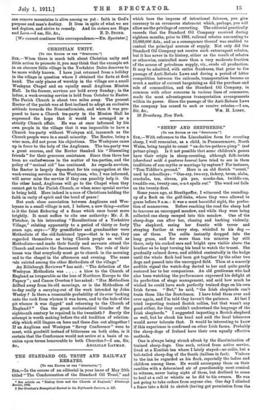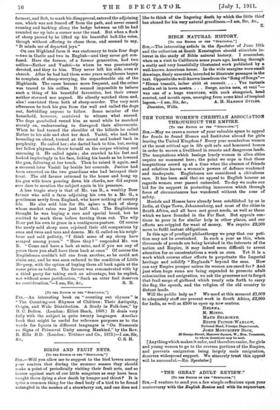"SHEEP AND SHEPHERDS."
[TO THE EDITOR OF THE " SPECTATOR...1
SIR,—With reference to the Lincolnshire form for counting sheep, I well remember, as a child, in Penmaenmawr, North Wales, being taught to count " un-du-tre-pethera-pimp " (not petuar-pimp). Is it not possible that some children's games have their origin in sheep-counting, although folk-lorista (cherchant midi a quatorze heures) have tried to see in them traditions of sun-myths or marriage by capture P For instance, " Tom Tiddler's ground." Here is an old Scotch "count," used by schoolboys : " One-ery, two-cry, tickery, teven, alaba, crackaba, ten, eleven, pin pan, muske-dan, twiddle-em, twaddle-em, twenty-one, o-u-t spells out." The word out falls on the twenty-first.
Some years ago, at Strathpeffer, I witnessed the rounding. up of a flock on the golf-links, where they were allowed to graze before 9 a.m. : it was a most beautiful sight, the perfec- tion of manoeuvres. Before reaching the road the sheep had to traverse an uncropped meadow, and while they were being collected one sheep escaped into this meadow. One of the sheep-dogs ran after her, chasing and barking violently. The shepherd, seeing her frantic with terror and straying further at every step, whistled to his dog — one of three. The collie instantly dropped into the long grass, and for more than ten minutes lay still there, only his cocked ears and bright eyes visible above the heather as he kept turning his head to watch the truant. She gradually calmed down, and nibbled contentedly in the hedge until the whole flock had been got together by the other two dogs and passed into the nncropped field. Then at a scarcely audible signal the watch-dog darted to her and quite gently restored her to her companions. An old gentleman who had also been watching the performance expressed his delight at its perfection of stage management, and said how much he wished he could have such perfectly trained dogs on his own Irish farms. " But," he said, " the Irish shepherds can't train them like the Scotchmen. I have tried them over and over again, and I'm told they haven't the patience. At last I tried importing trained Scotch collies, but that wasn't any good either, for they couldn't understand the language of the Irish shepherds." I suggested importing a Scotch shepherd as well, but he shook his head and said the local labourers would never tolerate that. It would be interesting to know if this experience is confirmed on other Irish farms. Probably the sheep-dogs of Ireland have their own equally effective methods.
One is always being struck afresh by the discrimination of trained sheep-dogs. One such, retired from active service, lived at a Kentish inn where I lately stayed—no collie, but a bob-tailed sheep-dog of the South (tailless in fact). Visitors to the inn he regarded as his flock, especially the ladies and children among them. He would accompany them on their rambles with a determined air of guardianship most comical to witness, never losing sight of them, but declined to come to heel at a call or whistle as he did to his owners. He was not going to take orders from anyone else. One day I climbed a fence into a field to sketch (having got permission from the farmer), and Bob, to mark his disapproval, entered the adjoining one, which was not fenced off from the path, and never ceased running and barking along the hedge between us till he had rounded me up into a corner near the road. But when a flock of sheep passed by he lifted up his beautiful bell-like voice, though without offering to chase them, and seemed to say, " It minds me of departed joys."
On one Highland farm it was customary to train four dogs —two in Gaelic and two in English—and they never got con- fused. Here the farmer, of a former generation, had two collies—Esther and Vashti—to whom he was passionately devoted, and they to him. They never left his side, even at church. After he had had them some years neighbours began to complain of sheep-worrying, the unpardonable sin of the Highlands. The cases became more frequent, and the crime was traced to his collies. It seemed impossible to believe such a thing of his beautiful favourites, but their owner neither stormed nor argued. He silently watched them and, alas ! convicted them both of sheep-murder. The very next afternoon he took his gun from the wall and called the dogs out, forbidding anyone to follow. Some member of the household, however, contrived to witness what ensued. The dogs gambolled round him as usual while he marched sternly on, endeavouring to disregard their allurements. When he had turned the shoulder of the hillside he called Esther to his side and shot her dead. Vashti, who had been bounding on ahead, turned at the sound and looked back in perplexity. He called her ; she darted back to him, but, seeing her fallen playmate, threw herself on the corpse whining and caressing it. He called again ; she crawled to his feet and looked imploringly in his face, licking his hands as he lowered the gun, faltering at her touch. Then he raised it again, and a moment later Vashti lay beside her comrade. Justice had been executed on the two guardians who had betrayed their trust. The old farmer returned to the house and hung up his gun with tears pouring down his cheeks, nor did anyone ever dare to mention the subject again in his presence.
A less tragic story is that of Mr. van R., a wealthy Boer farmer who sold a farm adjoining his own to a Mr. G., a gentleman newly from England, who knew nothing of country life. He also sold him for 30s. apiece a flock of sheep whose market value was just half that. The Englishman thought he was buying a rare and special breed, but he omitted to mark them before turning them out. The wily Buer put his own to graze in a contiguous pasture. Of course the newly sold sheep soon rejoined their old companions by ones and twos and tens and dozens. Mr. G. called on his neigh- bour and said politely, "I think some of my sheep have strayed among yours." " Have they ? " responded Mr. van R. " Come and have a look at mine, and if you see any of yours there you shall have them back at once." Of course the Englishman couldn't tell one from another, so he could not claim any, and be was soon reduced to the condition of Little Bo-peep, with the option of buying them all back again at the same price as before. The farmer was remonstrated with by a third party for taking such an advantage, but he replied, not without some justification, "Such an utter fool deserves no consideration."—I am, Sir, &c., R. B.















































 Previous page
Previous page